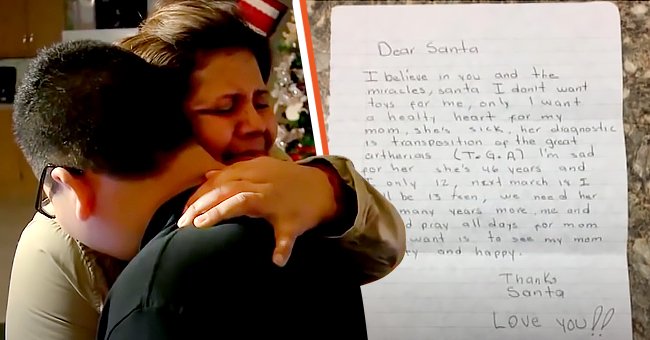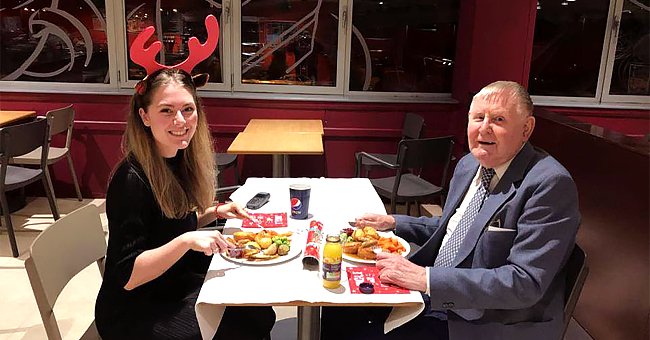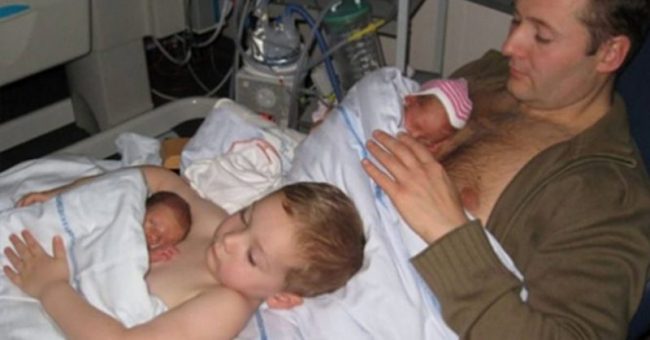Photo Of Boy Helping Dad Give Skin-To-Skin To Premature Twins Goes Viral
Touch is crucial for the development of physical, cognitive, language, social and emotional competence in children. In our lives, we use touch to show affection, to seek support in life, to interact with others and to build relationships. The power of touch is indisputable. Babies know as soon as they are born. In this way, newborns get to know the world and show their need to connect with their caregivers.
Human contact is thought to help premature babies recover faster than those left completely isolated in incubators. In the conventional medicine of the Scandinavian region of Europe, where skin contact is only recommended as an alternative to the incubation of premature babies, the use of incubators for premature babies is a priority in conventional medicine.
A photo of a little boy helping his father give skin to his premature twin siblings has melted many hearts. The photo was taken at the Hvidovre Hospital in Copenhagen in 2016 and posted on Facebook by a Danish family advocacy organization Forældre og Fødsel. The English-translated caption was uploaded by the South African-based Nino Birth Organization, and since then the photo has resurfaced and gained popularity. The picture shows the formation of a bond that will last.
I love the image of Big Brother helping his father look after the twins. Skin contact is nothing new, but Sweden is leading the way in making it more family-friendly for tiny babies.
According to their website, they stand for Neurosciences to Improve Neonatal Outcomes for All.
Carrying your newborn baby close to your chest at birth can make you feel safe or unsafe. It also depends on how your baby is born. The breast of the mother is the safest place. The baby is warm, heart and lungs are functioning perfectly. And the baby finds the breast and clings on.
This is particularly important for caesarean sections and frail premature babies. Once on the breast, the baby makes eye contact with the mother. This is the beginning of bonding in the first hours of life. And that’s where parents come in.
Tiny newborns can feel anxious and abandoned. Stress can make a baby’s body unstable. Fear can prevent trust and love from forming. You and your baby can be stressed and anxious. But here, too, something else is happening.
It is the difference that we should focus on. According to the Post, the renowned Swedish professor Uwe Ewald, who is known as an advocate of skin contact, was in the hospital in Hvidovre at the time. Swedish doctors encourage babies who weigh up to 700 grams and are breastfed by their parents to practice skin contact (SSC). Ewald’s revolutionary practice is that premature babies who are too small to get out of the incubator can get the treatment.
After the procedure, the baby is cleaned, dried and wrapped in a nappy while the caregiver is topless. Within one hour the child is fed and incubated again.
The baby calms down and gains weight. Skin contact helps the baby breathe better. Dr Ewald claims that the SSC warms the baby more than the incubator and protects it from severe infections by transferring protective bacteria into the baby’s system. Research has shown that their bacterial flora can reduce the risk of serious infections in sensitive children compared to hospital bacteria. And he points out that the breast-regulated temperature of the parents is better than that of an incubator.
The post was liked by over 3.5 million people and hundreds of them commented on it, with the majority believing the practice ensures better development and health of babies.
These are some of the comments:
Shelly F.: This is amazing. My baby was prem and born at 4 pounds 7 ounces and I wasn’t allowed to hold him most of the time, I was only ever offered skin to skin twice and he was in care for 26 days. I wasn’t allowed to stay with him. The most stressful time of my life but baby is ok and healthy. It’s a shame Australia isn’t on board with this…
Marie F.: “All of my older kids had to take a turn with the new baby inside their t-shirts as he was so fractious (not a babba anymore)… It settled him. The more ‘new’ trends I see emerging make me proud that I have been doing things right for years… Trust your instincts… Lovely pic.”
Emily Ann: ‘I couldn’t hold my twins until one week after they were born. Our skin to skin contact was so bittersweet and will definitely never be forgotten.’
Stephanie Savole: ‘I love this and wish this could have been happening where I live when my daughter was born. I cried looking at her in that machine.’
Malin N. wrote: “15 years ago in Sweden my very sick, tiny, heartsick baby spent most of her time on my husband’s chest. Not sure if she would make it, we treasured every minute she was brought out of the incubator. Today she is a healthy beautiful young lady. 
The recognized practice is so-called kangaroo care, designed to care for premature babies in areas where incubators are unavailable or unreliable. Parents do not have to insist on the practice and seek the doctor’s consent before a too-fragile baby can be put on the machine. It is a beautiful practice that is supported in many other parts of the world.










